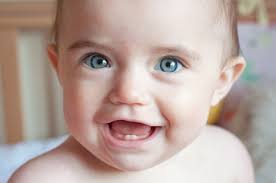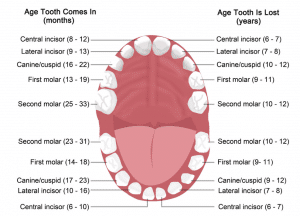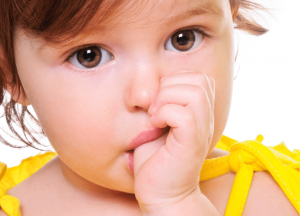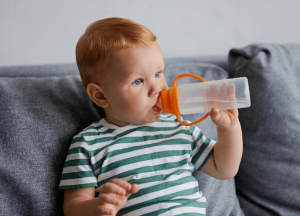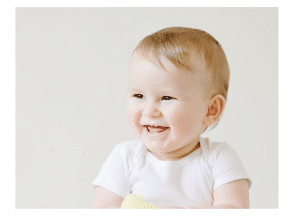Oral care begins even before your baby has visible teeth.
With a few simple habits, you can get your child on track for good dental health for a lifetime.
The importance of baby teeth
Baby teeth begin their development in utero but do not appear in the mouth until your baby is approximately 6-9 months old. The first tooth is usually the lower front tooth. Teeth may be present when your baby is born or first appear as late as twelve months of age. Even before teeth erupt, it is important to keep your baby’s mouth clean.
Following all feedings, be sure to clean your baby’s mouth and teeth.
- If the teeth are too small for an infant toothbrush, use a clean, damp facecloth to wipe their teeth and gums.
- Do not use toothpaste until your child has teeth.
- If your baby falls asleep while feeding, brush their teeth before feeding.
These first teeth are of major importance to your child’s appearance, chewing ability, speech development, placement of their adult teeth, and the eventual health of their permanent teeth. Baby teeth hold the space for the permanent teeth and help guide them into the correct position. They also contribute to healthy jaw development by guiding the jaws into position. Permanent teeth can become crowded when first teeth are removed too early. If baby teeth develop deep cavities, the infection can spread to the developing permanent teeth in the gums below.
Teething
Babies are as individual in their teething as they are in everything else. Some children are not bothered by new teeth erupting. Your baby may drool for months before the first tooth appears or have one of these common symptoms:
- red swollen gums irritability or crying
- mild fever loss of appetite
- sleeplessness finger sucking
- coughing jaw grinding
If your child has a high temperature, rashes, diarrhea or convulsions, speak with your doctor immediately. Remember that teething can make babies and children cranky but it should not make them sick. Many babies have sore or tender gums that make them irritable. To soothe tender gums, rub them with a clean finger or the back of a small, clean, cool spoon. A clean, cool teething ring may also be soothing. Do not freeze the teething ring
but it can be refrigerated. If your baby is still uncomfortable, then we can recommend some pain medication (acetaminophen) to reduce the discomfort.
Teething biscuits and bagels may also help but be sure that they do not contain any sugars that could cause tooth decay. For very young babies, these may cause choking and should not be used.
Thumbsucking and pacifiers
All babies are born with a natural sucking desire. This sucking desire is important. Without it, your baby would be unable to receive food in the early months of life. Sucking is also very comforting for your baby.
Compared with other muscles and senses, your baby’s mouth is highly developed. Within hours after birth, your baby will suckle at the breast or take milk from the bottle.
The sucking urge reaches a peak around the third or fourth month for most babies. After this stage, its urgency will lessen as your child finds new ways to interact with the world.
We suggest that if you use a pacifier, it should have a shape similar to the mother’s nipple. The natural shape will also help prevent the developing jaws from growing into the wrong position. Do not put sugar or honey on the pacifier, as this will cause tooth decay. Check the pacifier frequently to ensure it is in good condition and clean.
Most toddlers let you know when it is time to give up the pacifier. When you sense that your child is using the pacifier only out of habit, take it away and see what happens.
The need for thumb or pacifier usually decreases after age two or three. Sometimes prolonged sucking after age five can cause problems with normal dental development. Usually, if sucking stops before the permanent teeth start to erupt, the long-term effect is minimal. We can share some ideas that may help your child break this habit. Please let us know if this is a concern.
Nursing decay and baby bottle decay
When your baby feeds actively, he or she swallows. The movement of the cheeks and the flow of saliva clean the teeth. Once your baby has met its nutritional needs, then the sucking becomes more passive. Instead of being swallowed, the liquid clings to the teeth where it can cause tooth decay.
We suggest the following:
- After each feeding, wipe your child’s teeth and gums with a damp washcloth or gauze pad to remove any plaque. If possible, brush your child’s teeth with a small or baby toothbrush.
- Never allow your baby to fall asleep with a bottle containing milk, formula, fruit juice or any sweetened liquids.
- If your child needs a comforter between regular feedings, at night or during naps, fill a nursing bottle with cool water or give your child a pacifier.
- Babies should never go to bed with fluids other than water in their bottles. Other types of beverages (milk, juice, etc.) can cause “baby bottle caries” or sever tooth decay. The natural sugar in other fluids will remain on the child’s teeth throughout the night. This can damage the enamel and then cause tooth decay. If your baby must sleep with a bottle, fill it with water only.
If your child is already going to sleep with a bottle NOT containing water, please talk to us about stopping this habit.
What is tooth decay?
Tooth decay occurs when foods containing carbohydrates (sugars and starches) such as milk, breast milk, juice, cereals, and cookies are frequently left on teeth. Bacteria that live in the mouth thrive on these foods, producing acids. Over time, the acids destroy enamel, resulting in cavities. Tooth decay can occur even from drinking milk in your baby’s bottle or from breast milk as both contain natural sugars.
Bacteria stick to tooth surfaces in an environment we call “dental plaque”. Dental plaque is a thin, colourless, sticky film that constantly forms on your teeth. When you eat or drink foods containing sugars and starches, bacteria in the plaque produce acids, which attack the tooth surface. The stickiness of the dental plaque keeps these acids in contact with the tooth surface. Milk, if not swallowed, will accumulate around your child’s teeth and cause tooth decay.
Plaque, if not removed daily, will harden into calculus or tartar. Tartar irritates and destroys gum tissue. So, tooth decay and gum disease have a common origin: dental plaque. This material needs to be removed on a daily basis from all tooth surfaces.
Tooth cleaning for infants
It takes just a few minutes to start and establish this good habit even before the first tooth has erupted. Have your child lie on your lap, the floor or the change table. Make sure you can see your child’s mouth. Brush or wipe all around your baby’s gums and teeth with a soft baby brush or your finger wrapped in a damp washcloth. Don’t use toothpaste until your child has teeth. When the teeth start to erupt, use a small amount of fluoride-containing toothpaste and a soft small brush. Be sure that your child does not swallow the toothpaste.
Your child’s first visit to the dentist

A baby’s first visit to the dentist should happen by their first birthday, or when the first teeth appear.
To prepare for the first visit:
- Try playing “dentist.” Count your child’s teeth, then switch roles and let him or her count yours. Make the exercise fun and explain that this is what the dentist will do.
- Treat the appointment as routine.
- Tell your dentist about any special needs or medical problems, such as allergies or bleeding disorders.
Regular dental check-ups

Regular dental check-ups are an important part of any good prevention programme. Your child’s dental check-up allows us to detect problems when they are small, in order to keep them from becoming worse. Regular dental cleanings remove plaque and tartar built up around teeth which cause tooth decay and gum disease. Regular check-ups allow us to monitor the growth of your child’s teeth and jaws and treat potential orthodontic problems before they become major ones. If dental fillings are placed, our regular check-ups allows us to monitor the wear on existing fillings, replacing those which are worn out before they begin to break down and allow the tooth underneath to decay.
From reviewing current dental literature and from our own clinical observations, we feel that a policy of semi-annual check-ups, adopted by the Canadian Dental Association, provides a good preventative programme for your child. Some children may need more frequent monitoring, some less, but the semi-annual dental check-up is designed to prevent costly long-term dental problems and enhance your child’s overall oral health.
Tooth decay can be prevented. Cliffcrest Family Dental can help you reduce tooth decay with some easy techniques involving regular care under our guidance.
Starting your child on the right track will allow us to guide your child to a life of good dental health. Regular care should start before your child is born with good nutrition.
10 tips for parents to help build healthy oral habits for their children
1. Before your baby even has teeth, wipe the gums gently with a clean wet cloth after each feeding.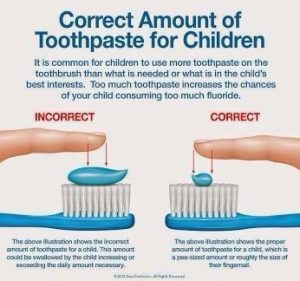
2. If your baby sleeps with a bottle or sippy cup at naptime or bedtime, fill it with water only.
3. If your baby normally falls asleep while feeding, brush his or her teeth before feeding.
4. Lift your baby’s lips and watch for changes in colour, lines or spots on your child’s teeth as these may be signs of potential problems.
5. As soon as the first tooth appears, start brushing your baby’s teeth with fluoride toothpaste in the morning and before bedtime.
6. Put a small dab of toothpaste across a small soft brush.
Wipe off excess toothpaste until the child can spit it out.
Begin flossing once a day when your child’s teeth are touching.
7. Change your child’s toothbrush every one to three months or immediately after an illness.
8. Let your child watch you brushing your teeth and assist your child’s tooth brushing.
9. To prevent spreading germs that cause tooth decay, do not put anything in your child’s mouth if it has been in your mouth. Don’t share spoons, cups, foods, toothbrushes etc.
10. Have your baby come for their first visit by the age of one year or when the first teeth appear. Make sure we see your child for regular check-ups.

